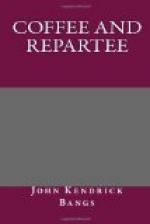“Perfect bosh!” repeated the School-master. “And only shows how in weak hands so beautiful a thing as the sonnet can be made ridiculous.”
“What’s wrong with it?” asked the Idiot.
“It doesn’t contain any thought—or if it does, no one can tell what the thought is. Your rhymes are atrocious. Your phraseology is ridiculous. The whole thing is bad. You’ll never get anybody to print it.”
“I do not intend to try,” said the Idiot, meekly.
“You are wise,” said the School-master, “to take my advice for once.”
“No, it is not your advice that restrains me,” said the Idiot, dryly. “It is the fact that this sonnet has already been printed.”
“In the name of Letters, where?” cried the School-master.
“In the collected works of William Shakespeare,” replied the Idiot, quietly.
The Poet laughed; Mrs. Smithers’s eyes filled
with tears; and the
School-master for once had absolutely nothing to say.
XI
“Do you believe, Mr. Whitechoker,” said the Idiot, taking his place at the table, and holding his plate up to the light, apparently to see whether or not it was immaculate, whereat the landlady sniffed contemptuously—“do you believe that the love of money is the root of all evil?”
“I have always been of that impression,” returned Mr. Whitechoker, pleasantly. “In fact, I am sure of it,” he added. “There is no evil thing in this world, sir, that cannot be traced back to a point where greed is found to be its main-spring and the source of its strength.”
“Then how do you reconcile this with the scriptural story of the forbidden fruit? Do you think the apples referred to were figures of speech, the true import of which was that Adam and Eve had their eyes on the original surplus?”
“Well, of course, there you begin to—ah—you seem to me to be going back to the—er—the—ah—”
“Original root of all evil,” prompted the Idiot, calmly.
“Precisely,” returned Mr. Whitechoker, with a sigh of relief. “Mrs. Smithers, I think I’ll have a dash of hot-water in my coffee this morning.” Then, with a nervous glance towards the Idiot, he added, addressing the Bibliomaniac, “I think it looks like rain.”
“Referring to the coffee, Mr. Whitechoker?” queried the Idiot, not disposed to let go of his victim quite so easily.
“Ah—I don’t quite follow you,” replied the Minister, with some annoyance.
“You said something looked like rain, and I asked you if the thing you referred to was the coffee, for I was disposed to agree with you,” said the Idiot.
“I am sure,” put in Mrs. Smithers, “that a gentleman of Mr. Whitechoker’s refinement would not make any such insinuation, sir. He is not the man to quarrel with what is set before him.”
[Illustration: “HOLDING HIS PLATE UP TO THE LIGHT”]
“I ask your pardon, madam,” returned the Idiot, politely. “I hope that I am not the man to quarrel with my food, either. Indeed, I make it a rule to avoid unpleasantness of all sorts, particularly with the weak, under which category we find your coffee. I simply wish to know to what Mr. Whitechoker refers when he says ‘it looks like rain.’”




